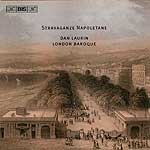Though 17th-century Naples often was beset by political and economic turmoil (as well as a deadly plague in 1647 that killed two-thirds of its population), its four well-established conservatories continued to thrive and attract talented students and composers from throughout Europe. London Baroque here offers a diverse sampling of trio sonatas (Archangelo Corelli’s Fuga con un Soggetto solo being the only exception) by some of the better known Neapolitan composers of the era. Of the eight works included, five are from a 1725 manuscript collection of 24 sonatas for recorder and strings, the solos performed by BIS house recorder player Dan Laurin. In all of these works Laurin functions mostly as a passive member with the ensemble, though there are moments (especially in Francesco Mancini’s Sonata XIII in G minor and Francesco Barbella’s Sonata III in C major) where his contributions heighten the lyricism of these otherwise undistinguished fugue-based works.
Of the non-recorder works, Corelli’s aforementioned Fuga con un Soggetto solo is fascinating for its remarkable thematic similarity to the opening of Handel’s “Hallelujah” chorus from Messiah. Since Corelli preceded Handel by a generation, and given Handel’s notorious reputation for recycling his own as well as other composers’ material at whim, arguably the theme could have originated with Corelli. London Baroque has great fun here, brilliantly extracting and illuminating this all-too-brief fugue’s complex wealth of inner detail.
Also included is another example of a work whose theme a more famous composer eventually “borrowed” (though thoughtfully credited)–Domenico Gallo’s Trio Sonata No. 1 in G major. In his review of Parnassi Musici’s previous CPO recording of Gallo’s 12 trio sonatas originally attributed to Pergolesi (type Q1902 in Search Reviews) colleague David Vernier noted the similarity between the theme of the first sonata’s opening Moderato movement to the one Stravinsky quotes in the opening Overture of his famous ballet Pulcinella. Unlike Parnassi Musici however, who play up the Trio’s lively character, London Baroque’s comparatively slower tempos and excessive ornamentation undermine any of the work’s possible pretentions beyond Baroque convention. As usual, BIS’s sound is first rate, with excellent clarity and ensemble presence. In the notes Dan Laurin and London Baroque’s director and cellist Charles Medlam discuss the period and the significance of each work on the program. Recommended with reservations.
































